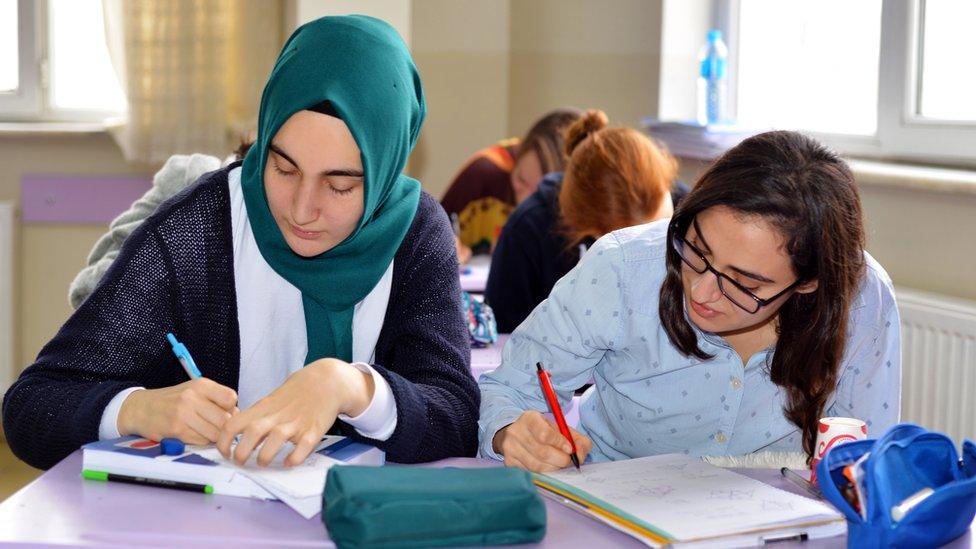League tables: New targets see 282 secondaries underperforming
- Published
- comments

A total of 282 secondary schools in England are deemed to be failing by the government, as they have not met a new set of national standards.
From this year, schools are being judged by new measures, which take greater account of pupil progress and their basic ability than raw results.
The Department for Education says the measures present a clearer picture of how well schools are performing.
Head teachers say the results come amid a funding and recruitment crisis.
Up until this year, schools have been rated predominantly by raw GCSE results - based on what proportion of pupils get five A* to C GCSEs, including English and maths.
Tap here, external to search for the results for your area.
Last year, under the old measures 312 schools were considered to be failing.
Now, a new measure is being used, based on GCSE results from grades A* to G across eight subjects, known as Attainment 8, external, along with another measure, known as Progress 8, external.
These changes mean this year's results cannot be compared with previous years, as this is the first year that schools and pupils have been assessed under the new system.
Progress and Attainment 8 measure how a student progresses through secondary school, taking into account their ability at the end of primary school.
Most schools will achieve a score between -1 and 1, with 0 being average.

This year, secondary schools are considered under-performing if their Progress 8 score is below -0.5 (well below average) and below a further complex calculation that shows government statisticians are confident that score is accurate.
Depending on individual scores, schools will be placed in one of five bands for progress - average, above average, well above average, below average or well below average. Parents are likely to find these descriptors easier to read than the raw numbers.
Regional differences
The data shows wide variations in regional performance.
In the North West of England, one in six secondary schools is under-performing, while at the other end of the scale, London has the lowest proportion of under-performing schools.
In total, 3.1% of the capital's secondary schools fall below the new threshold, while just 2.2% of its secondary-age pupils are at a school that failed to make the target.
Knowsley on Merseyside was the worst performing local authority, with all six of its secondary schools falling floor below standards, while in Darlington, 42.9%, of schools are labelled failing and 38.5% sub-standard in Oldham.
Looking at the gender gap, girls made more progress on average than boys, despite any higher prior attainment they may have had.
Girls made above average progress, at 0.11, while boys made below average, at -0.17.
Disadvantaged pupils
Disadvantaged pupils (those qualifying for free school meals) made significantly less progress on average than non-disadvantaged pupils nationally during secondary school.
The Progress 8 score was -0.03 for all pupils in all state secondary schools, compared with -0.38 for disadvantaged pupils.

This is significant because it shows that disadvantaged pupils are held back at secondary school by more than lower prior attainment.
The national average result for Attainment 8 was 49.9 - this is expressed as points out of 80.
It is a total of the raw results across individual pupils' best eight GCSE subjects at grades A* to G, including English and maths, with more points attached to higher grades.
Girls got better results nationally than boys. They scored an average of 52.3 and 47.7 respectively.
School Standards Minister Nick Gibb said the results "confirmed that the hard work of teachers and pupils across the country was leading to higher standards".
He added: "Under our reforms, there are almost 1.8 million more young people in good or outstanding schools than in 2010, and through our new, fairer Progress 8 measure, we will ensure that even more children are supported to achieve their full potential."
Malcolm Trobe, interim general secretary of the Association of School and College Leaders, said schools and pupils should be congratulated on the results, which had been achieved "against a national backdrop of a funding and recruitment crisis".
'Unreliable?'
He said Progress 8 was a fairer way of measuring school performance as it better reflected the fact that children start secondary school at different levels of academic ability.
But he warned that parents should remember no system of measuring school performance was perfect.
"It is their [parents'] judgement which is most important and they should base that judgement on the whole picture of the school's curriculum and culture and whether it is the best fit for their child," he said.
Kevin Courtney, head of the National Union of Teachers, said a majority of teachers questioned the validity of Progress 8, as they believed the Key Stage 2 results used to provide children's prior attainment did not provide a reliable benchmark from which to measure.
"Key Stage 2 tests are not just narrowly based, but notoriously unreliable. Yet this benchmark is being used to hold schools accountable.
"The union is concerned that in progress 8 the DfE has introduced another measure that simplifies learning, boils down progress to a single number, and prevails upon teachers and the school leaders to organise their work around it."
- Published19 January 2017

- Published15 December 2016
